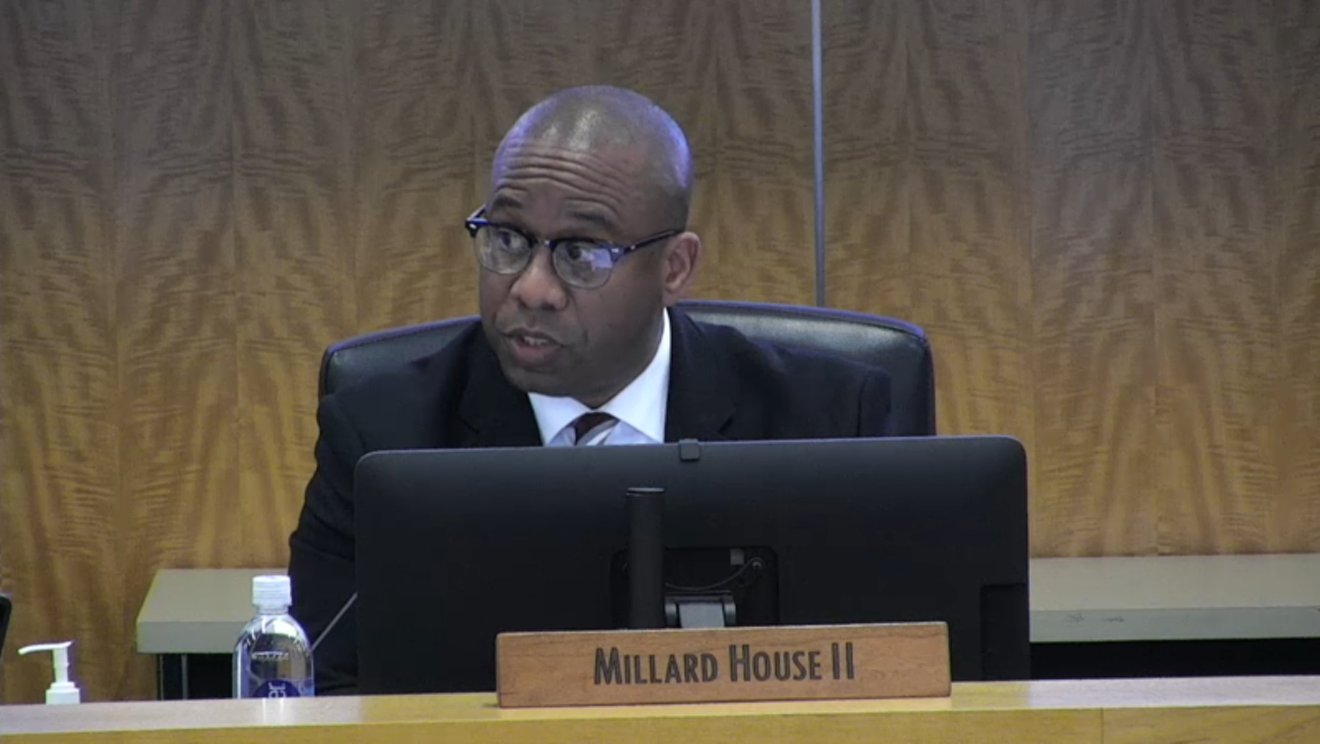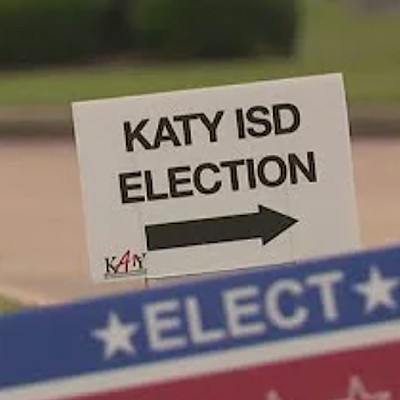As Superintendent Millard House II sees it, that’s not working.
"Houston is very unique because you don't see very many decentralized models across the country," he said in a wide-ranging interview with the Houston Press this week, two days before his first State of the Schools speech Friday at a luncheon at the Marriott Marquis,
House, who was named HISD superintendent in June 2021, reiterated parts of his recently released five-year school plan which calls for counselors, nurses and library help in every school – employee assignments that will no longer fall under the “discretionary” column for principals. He's also calling for a centralization of certain teaching approaches particularly in elementary reading and math.
"We know that mobility is a struggle in HISD. With students moving from one school or one area of town to the next, we want to make sure that wherever they land there’s some consistency from an academic standpoint," he said.
Previous superintendents have worked to lessen the power of decentralization, with little success. House has some strong arguments on his side: HISD’s student population has declined in the last "10-15 years," he says, which has only exacerbated the district’s financial distress. "At one point HISD was a school district of about 215,000 students," he said. "We're currently a school district of a little under 195,000 students. A lot of that has to do with people leaving their neighborhood schools."
Given the present spike in gas prices, not to mention minutes and hours used up in transport time, wouldn’t it be better to re-invest in neighborhood schools and make sure that all of them are operating on the same plane? Shouldn't all schools have good teachers? Shouldn't the high schools all offer courses that will best set up students for college or the workplace?"At one point HISD was a school district of about 215,000 students. We're currently a school district of a little under 195,000 students. A lot of that has to do with people leaving their neighborhood schools."
tweet this
These are long-standing much debated concerns. But despite the "extensive community engagement" in a series of public meetings that House stresses took place to garner public comment from teachers and the community, to many parents and principals any challenge to decentralization invokes anger, resistance and images of a top-heavy administration constantly divebombing schools with second guesses and picky recriminations.
If a school has developed a special reading or math program that works for it, does that have to be jettisoned in favor of district unity? If there is true financial equity will some of the schools that have more now, have less and see their programs diluted? And aren't engaged principals on the front lines at their schools best at knowing what that school needs?.
"We have some wonderful programs, schools, magnets that are out there. My expectation is that we continue to support those schools to be wonderful," House said. "We're not looking to change the game in terms of what we're doing in some of our schools that are considered high performing or best in programming. What we are looking to do is to expand and duplicate."
At the same time as House is trying to push his ideas through, he's working with a significant trust deficit, not of his making but very present. Parents of special ed students, exhausted by years of failed promises of reform, take their complaints directly to the Texas Education Agency, skipping the Hattie Mae White administration building entirely.
Besides the communication breakdown, probably the most important improvement that needs to be made in HISD's special ed program is "compliance," House said. "Making sure we do what we say we're going to do in that ARD [Admission, Review and Dismissal meeting to determine whether a student qualifies for special education] meeting or that IEP [Individual Education Program, a plan of study for that student]."
A lot of people are convinced that many district employees and board members see the district as a cash cow for illegal side dealings with vendors — which happens over and over again despite every HISD security system set in place — particularly given the recent FBI investigation and convictions involving district personnel in the procurement department, a former trustee and a vendor.
"One of the things we're doing is taking a close look at our systems and processes to make certain and do our best that the vulnerability that we've had in this district and the dishonest practices don't occur in the future," House said. "It's like what we see in the cyber world. People will look for a better way to beat the system but we have to stay ahead of bad actors."
House's promised closer look is welcome, but he's making these assurances to a public that has heard similar ones before from previous administrations and been disappointed.
One thing that House has on his side that his most recent predecessors former Superintendent Richard Carranza and Interim Superintendent Grenita Lathan did not is a school board that to date has been pretty low key, avoiding the kind of public vitriolic attacks launched by some previous board members upon each other. While alternately entertaining and appalling to those attending school board meetings, the continued soap opera attracted unwanted attention from the TEA and was a contributor to the state agency labeling the district's board operations dysfunctional.
"My attitude is: the past is the past. We're here now, about to have our State of the Schools. That includes a board that is supportive of what the major needs for children are," House said. "I've seen this board do their best to continuously get better. One of the things I shared with this board during the interview process was, there will be issues from time but drama is a choice. Drama's a choice.
"We need to ensure that we hash things out in terms of disagreement behind closed doors because our community's watching. Our children are watching. TEA is watching. And it's important that we function as a team of ten."
House has already displayed some degree of pragmatic flexibility in his plans. In response to questions about how to install a library in an older school that has never had one and has limited space, House said this week, "Schools can choose between librarians and media specialists. There are some situations where a school may not have the physical space to put in a library so we may hire a media specialist that may allow them to have the digital inventory.""We need to ensure that we hash things out in terms of disagreement behind closed doors because our community's watching. Our children are watching. TEA is watching. And it's important that we function as a team of ten."
tweet this
Counseling work — a chronic source of complaints from parents and students and from counselors themselves who say there aren't enough of them — involves both college and career readiness as well as the social /emotional side he said. Asked if he'd noticed that counseling programs in some schools weren't nearly as good as others, House responded dryly, "What we've noticed is that in some places we didn't have it at all."
He knows there's a lot of work to be done with and for the teachers in HISD in terms of training, support and compensation. "We know a third of our teachers have asked themselves whether teaching or education is the profession for them." In one of his previous districts they had a "grow your own talent" program where college students who committed to working for the school district upon graduation, had their education paid for. He'd like to see that tried here.
HISD ranks 11th of the 12 school districts in the region in almost every category of compensation, House said "That makes it very difficult in the competition among districts for talent."
Even as he talked about more pay for teachers, it is clear that the district's chronic financial deficit status — now estimated at $69 million — weighs heavily on him and he is determined to change that even if that means some anticipated headbutting with principals and the community. On March 3, he surprised a lot of people when he announced a budget freeze on central office hiring, campus spending and central office budgets, saying he could save as much as $100 million in unspent expenditures for the rest of the year.
At Thursday night's board meeting, several parents and educators weren't very happy with this abrupt funds cutoff and also questioned the superintendent's plans to change the way student funds are allocated at each school in the 2022-23 year.
"This has been a district that for some time has practiced a decentralized model and when you practice something for quite some time, change is not easy. We've also ocarneperated under a deficit which is not healthy at all. And that's been the operational norm for quite some time. I'm wanting to over the course of the next five years not concentrate on utilizing and being okay with the deficit," House said earlier in the week.
"With that in mind we have to do some things differently. We know that principals that have experienced a little bit different model are really okay with the idea. We have some that have not experienced this kind of model and it's taking some additional support that this is not about just one school. This is about our district as a whole. This is about what's doing what's best for children."
Key to any improvement in student abilities is reading, House said. Amid all the debates about the best approach to teaching reading (phonics, balanced reading, guided reading and countless others) House believes a crucial element is an early start, saying he hopes to expand the number of pre-K classrooms by 22 in year one. (The programs the district plans to start using in the 2022-23 school year are Eureka for elementary math, Carnegie for middle school match and a reading program called Amplify designed for grades K-5. All promise personalized, engaging approaches for students.)
Hanging in the background, of course, is the stalled effort by the TEA to take over the district, first started in 2019 and now tied up in the courts. Despite this, a new school board was elected and House is here and has had several discussions with TEA Commissioner Mike Morath. "There haven't been any conversations about the specific takeover of late. The conversations have been focused on the work and the direction that we're going," House said.
In the past year, House has dealt with the issue of masks as a protection against COVID-19 and unlike most districts in the state, he made them mandatory for students, employees and visitors to district campuses. A very vocal minority was not happy with his decision and said so in any number of ways.
He sticks by his decision which was recently lifted with a drop in local COVID cases and hospitalizations and points to the fact that "Unlike some school districts, we haven't had the loss of life this school year.
"I'm a father. I have two students in the school system and my son didn't want to wear a mask either. My 10-year-old expressed that to me quite a bit. But I think we did the right thing. My hope is we're on the back end of this pandemic."
Asked for the most important thing he'd like to accomplish in the next year alone, House spoke of "high quality curriculum — execution and fidelity are important. I'm also excited about being able to attract and retain great educators because our students need strong educators to be in front of them."







